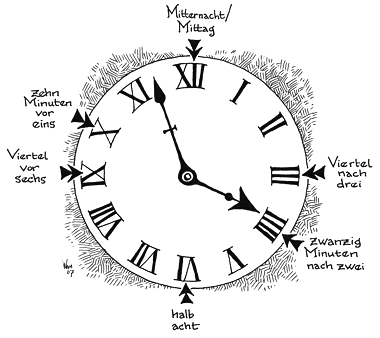2.3.1.1: die Uhrzeiten
- Page ID
- 105394
Cases: Die Uhrzeiten
To describe the times of the day, German uses four prepositions: um and gegen for specific times. um is used when an event happens at a particular time, gegen is used to refer to events that happen about a certain time (e.g., noonish). Am is used to describe larger time periods, such as the morning, the afternoon or in the evening. In is used exclusively with Nacht: in der Nacht = at night.
| die alte Hexe | Wissen Sie, wie spät es ist? Mitternacht! Warum sind Sie noch im Garten? | Do you know what time it is? Midnight! What are you still doing in the garden? |
| Wolfgang | Ja, ja, ich weiß. Ich lese gerade ein episches Gedicht über meinen Vorvater, namens Beowulf. Die Bibliothek macht um 9 Uhr auf, und ich muss das Buch pünktlich zurückbringen. | Yes, yes, I know. I am reading an epic poem about my ancestor called Beowulf. The library opens at 9 o'clock, and I have to return the book on time. |
| die alte Hexe | Ich habe mir aber den Garten für die ganze Nacht reserviert! | But I reserved the garden for myself for the entire night! |
| Wolfgang | Das ist unmöglich! Der Garten gehört doch uns allen! | That's impossible, the garden belongs to everyone! |
| die alte Hexe | Hah! Heute ist der 30. April, Walpurgisnacht. Und dies ist die einzige Nacht im Jahr, in der ich den Garten für mich und meine Freundinnen reserviere! Sie werden so gegen Mitternacht ankommen, also Sie müssen sofort zurück ins Schloss!!! | Hah! Today is the 30th of April, it's Walpurgisnacht. And this is the only night the entire year when I reserve the garden for me and my girlfriends! They are expected to arrive around midnight, so you have to get back to the castle right away! |

Clockwise, starting at top:
|
Mitternacht/Mittag |
12:00 |
|
Viertel nach drei |
3:15 |
|
zwanzig Minuten nach zwei |
2:20 |
|
halb acht |
7:30 |
|
Viertel vor sechs |
5:45 |
|
zehn Minuten vor eins |
12:50 |
Expression list
| um Mitternacht (f) | at midnight |
| am Morgen (morgen früh) | in the morning (tomorrow morning) |
| um 10 Uhr | at 10 o'clock |
| um Viertel nach/vor 11 | a quarter after/before 11 |
| am Vormittag | during the morning (i.e., before noon) |
| am Mittag/bis Mittag | at noon/until noon |
| am Nachmittag | in the afternoon |
| fünf Minuten vor zwei/nach | five minutes before/after two |
| um halb sechs | at 5:30 |
| am Abend (am Vorabend) | in the evening (the evening/night before) |
| in der Nacht | at night |
| jede Sekunde/Minute/Nacht | each second/minute/night |
| den ganzen Tag/die ganze Nacht | the whole day/the entire night |
| später (verspätet sein) | later (to be late) |
| es ist zu früh! | it's too early! |
| du bist spät | you're late! |
| am Tag/pro Tag/täglich | in the day/each day/daily |
| die Stunde | hour/the hour/every hour |
| abends | (every) evening |
| morgens | (every) morning |
| mittags | (every) noon |
| Wann?/Wie oft? | when?/how often? |
Contrary to popular belief, Germans don't use "military" time (i.e., they don't say "twenty-two hundred hours"). In public places, such as at the train station, on TV or in university schedules, Germans use the 24-hour system:
| 7 Uhr = 7 am | 19 Uhr = 7 pm |
| 7 Uhr 20 (7.20) = 20 minutes past 7 (am) | 19 Uhr 20 (19.20) = 20 minutes past 7 (pm) |
The greetings for different parts of the day take the accusative case: I wish you a good morning, day, evening, night (because the thing you wish is the direct object!):
| morning (~5 am to 10 am): | Guten Morgen! |
| day (~10 am - 4 or 5 pm): | Guten Tag! |
| evening (~4 or 5 pm to 8-ish): | Guten Abend! |
| night (when taking leave at the end of a day or going to bed): | Gute Nacht! |
Dialog
| eine Hexe | Grüss dich, Heidrun! Es tut mir leid, dass ich so spät bin! | Hello, Heidrun! I'm sorry I'm so late! |
| die alte Hexe | Kein Problem, Ilse! Es ist erst 5 Minuten nach Mitternacht. Aber warum bist du nicht auf deinem Besen geflogen? | No problem, Ilse! It's only 5 minutes after midnight. But why didn't you fly here on your broom? |
| Ilse | Na, weißt du, hunderte von Flugzeugen fliegen die ganze Nacht durch die Luft, und es wird immer gefährlicher, auf meinem Besen hin- und her zu fliegen! Wann kommen die anderen an? | Well, you know, hundreds of airplanes fly in the air the entire night, and it's getting more and more difficult to fly around on my broom! When are the others getting here? |
| die alte Hexe | Frage nicht! Es ist eine wahre Schande! Sie haben sich einen Tourbus gemietet ... Sie könnten jede Minute hier sein. | Don't ask! It's an absolute disgrace! They rented a tour bus ... They could be here any minute now. |


